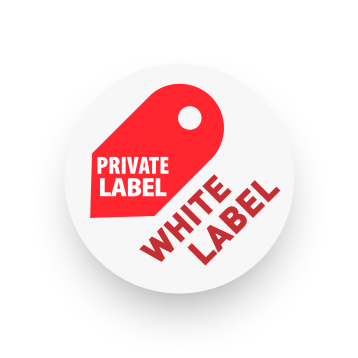We’re going to settle the White Label vs Private Label debate once and for all. White Label and Private Label are often used interchangeably. However, there is a difference which most people don’t understand. Some people will say that “Private Label” has to do with products and that “White Label” has to do with services. But this assertion that one term has to do with products and the other does not is incorrect. We know this because of the etymology of the word White Label: “The name derives from the image of a white label on the packaging that can be filled in with the marketer’s trade dress. Its origins can be traced to white label promo vinyl records.” So, we see that Private Label is not exclusive to products.
So, what is the difference between white label and private label?
The difference is who specifies what the product or service will contain. In a private label relationship, the buyer specifies the design, parts, ingredients, or offerings. In a white label relationship, while the provider or manufacturer may offer a range of customizations to fit specific needs, they specify the design, parts, ingredients, or offerings. Sound confusing, it’s not. Just keep reading it will become clear shortly.
The concept has more clarity when it comes to products and loses some distinction when looked at with services, which is most likely why the misnomer came to be that the term white label is related only to services.
White Label vs Private Label vs. Reseller Products Compared:
Let’s start with products first: (or jump to White Label vs. Private Label Services)
Private Label Products:
A private label product is manufactured by a contract or third-party manufacturer and sold under your brand name. As the buyer, you specify everything about the product – what goes in it, how it’s packaged, what the label looks like. Typically you pay to have it produced and delivered to your warehouse or store, although you can sometimes contract to have it drop shipped. You then sell the product to other wholesalers or directly to consumers.
A Private Label Product example: You (Mrs. Jones) have a family recipe for Apple Pie. You find a manufacturer that can mass-produce apple pies using your EXACT recipe. That manufacturer makes and bakes your apple pies, puts them in the packaging (specified by you) with Mrs. Jones Apple Pies, and sells and ships Mrs. Jones Apple Pies to you. You can either: Sell Mrs. Jones Apple Pies to Wholesalers who then sell it to retail grocers, or you sell Mrs. Jones Apple Pies at www.mrsjonesapplepies.com.
Benefits:
You control product ingredients / parts
Product is your EXACT specification
You control packaging
You get Brand Recognition
Drawbacks:
Can’t Do this without your own product design / recipe.
Increased R&D Costs
Longer Time to Market
Often more expensive than white label
Reseller of Products
Contrast the above with buying products from other companies with their brand names on them. In this case, you buy the product from the manufacturer with their label (and brand) on it. You then resell the product to your customers.
Reseller example: You own a store, and you buy Mrs. Jones Apple Pies, and then you sell (resell) them to your customers.
Benefits:
Less Expensive than Private Label
Product may be already well-known brand
Drawbacks:
You don’t get brand recognition
White Label Products:
White label products are manufactured by a contract or third-party manufacturer and sold under your brand name. As the buyer, you ONLY specify what the label looks like. In this case, the manufacturer is already an expert in manufacturing the product you want, they produce the same product under other brand names, and therefor the manufacturer specifies the what goes in it and how it’s packaged other than the brand name you specified that appears on the label.
A White Label Product Example: You (Mr. Smith) want an Apple Pie that Looks like you made it, but you don’t have a recipe or the ability to mass-produce apple pies. You contract with a manufacturer who specializes in making delicious apple pies. They take their apple pie, bake it, package it, and put your label Mr. Smith’s apple pies on it. They ship Mr. Smith’s Apple pies to you. You can either: Sell Mr. Smith’s Apple Pies to Wholesalers who then sell it to retail grocers, or you sell Mr. Smith’s Apple Pies at www.mrsmithspplepies.com.
Benefits:
You don’t have to be an expert
You don’t have to have a design/recipe
Often less expensive than Private Label
You get brand recognition
Drawbacks:
You choose an existing product but don’t control or specify product ingredients/parts
Why Can Private Label Products Be More Expensive Than White Label Products?
Simply put, manufacturing efficiency. Because private label products are entirely specified by you, the manufacturer must build a manufacturing process or system that is only used to create and develop your products. While there may be similarities between your product and another similar product they manufacture, your product is uniquely yours (exclusive). Those changes to the manufacturing process increase costs which are passed on to you.
In the case of white label, you lose exclusivity, meaning the manufacturer can produce the same product for you and others, while all that changes is the label. Because the manufacturer can produce the same product repeatedly for multiple customers, those efficiencies are shared with you, and other buyers and the resulting reduced costs are passed on to you.
This is, of course, can change if you have enough volume to offset these cost factors. When you reach that level of volume, you may have reached a level where you no longer need contract manufacturing and can cost-effectively manufacture the product on your own.


